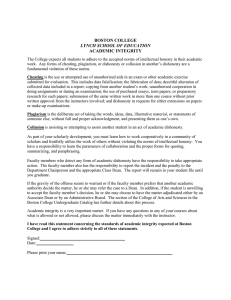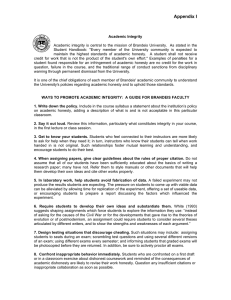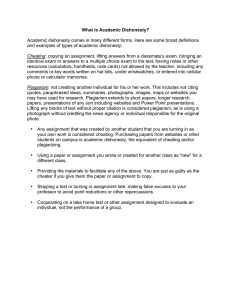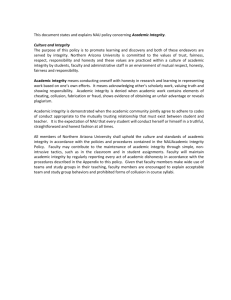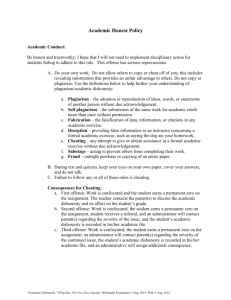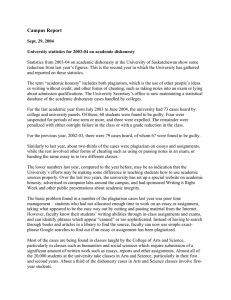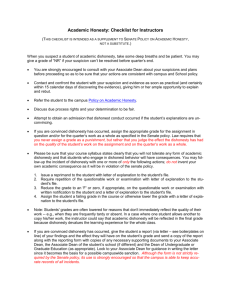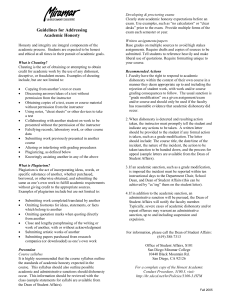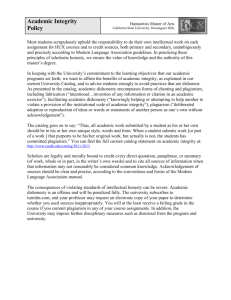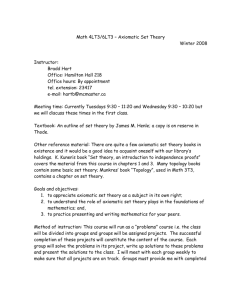Department of Communication Attendance Policy
advertisement
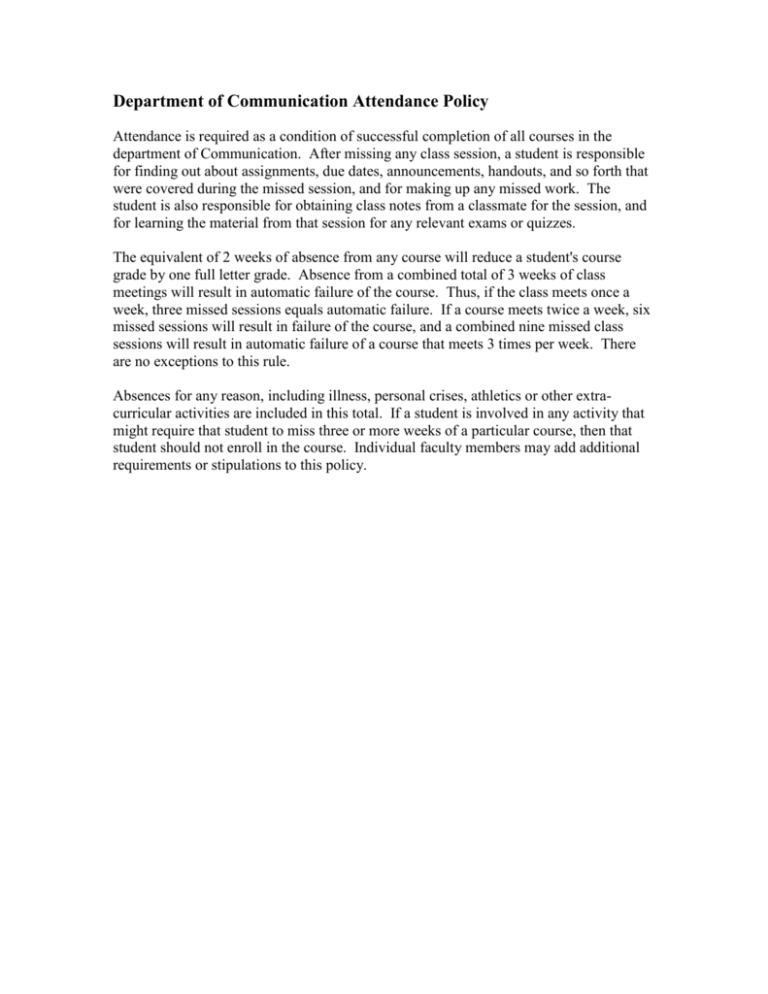
Department of Communication Attendance Policy Attendance is required as a condition of successful completion of all courses in the department of Communication. After missing any class session, a student is responsible for finding out about assignments, due dates, announcements, handouts, and so forth that were covered during the missed session, and for making up any missed work. The student is also responsible for obtaining class notes from a classmate for the session, and for learning the material from that session for any relevant exams or quizzes. The equivalent of 2 weeks of absence from any course will reduce a student's course grade by one full letter grade. Absence from a combined total of 3 weeks of class meetings will result in automatic failure of the course. Thus, if the class meets once a week, three missed sessions equals automatic failure. If a course meets twice a week, six missed sessions will result in failure of the course, and a combined nine missed class sessions will result in automatic failure of a course that meets 3 times per week. There are no exceptions to this rule. Absences for any reason, including illness, personal crises, athletics or other extracurricular activities are included in this total. If a student is involved in any activity that might require that student to miss three or more weeks of a particular course, then that student should not enroll in the course. Individual faculty members may add additional requirements or stipulations to this policy. Department of Communication Policy on Academic Integrity The department of Communication holds the highest standards of academic honesty for Boston College Communication majors. The maintenance of these standards is essential to the basic functioning of the department as an academic community, and makes possible the conduct of fair, meaningful, and worthwhile educational experiences. Because the faculty of this department takes academic honesty so seriously, we remind all students in all Communication courses of the academic integrity statement signed by all students upon matriculation at Boston College. Please re-read the statement carefully. Instances of cheating, plagiarism, dishonesty or collusion will be treated seriously within the department of Communication. Sanctions for such breaches of academic integrity range from failure of the course to expulsion from Boston College. All cases will be referred to the department chairperson or the Dean of the College of Arts and Sciences. To ensure honesty in written work, the department requires all written assignments for all department courses to be submitted on diskette as well as on paper. The diskettes will be checked for plagiarized material internally within the department and externally through a professional service. Written work will not be accepted unless it is accompanied by a diskette version. STATEMENT ON ACADEMIC INTEGRITY FROM BC'S COLLEGE OF ARTS AND SCIENCES The College [of Arts and Sciences] expects all students to adhere to the accepted norms of intellectual honesty in their academic work. Any forms of cheating, plagiarism, or dishonesty or collusion in another’s dishonesty is a fundamental violation of these norms. CHEATING is the use or attempted use of unauthorized aids in any exam or other academic exercise submitted for evaluation. This includes data falsification; the fabrication of data; deceitful alteration of collected data included in a report; copying from another student’s work; unauthorized cooperation in doing assignments or during an examination; the use of purchased essays, term papers, or preparatory research for such papers; submission of the same written work in more than one course without prior written approval from the instructor(s) involved; and dishonesty in requests for either extensions or papers or make-up examinations. PLAGIARISM is the deliberate act of taking the words, ideas, data, illustrative material, or statements of someone else, without full and proper acknowledgement, and presenting them as one’s own. COLLUSION is assisting or attempting to assist another student in an act of academic dishonesty. As part of your scholarly development, you must learn how to work cooperatively in a community of scholars and fruitfully utilize the work of others without violating the norms of intellectual honesty. You have a responsibility to learn the parameters of collaboration and the proper forms for quoting, summarizing and paraphrasing. Faculty members who detect any form of academic dishonesty have the responsibility to take appropriate action. The faculty member also has the responsibility to report the incident and penalty to the Department Chairperson and the appropriate Class Dean. The report will remain in your student file until you graduate. If the gravity of the offense seems to warrant it or if the faculty member prefers that another academic authority decide the matter, he or she may refer the case to a Dean. In addition, if the student is unwilling to accept the faculty member’s decision, he or she may choose to have the matter adjudicated either by an Associate Dean or by an Administrative Board. The section of the College of Arts and Sciences in the Boston College Undergraduate Catalogue has further details about this process. Academic integrity is a very important matter. If you have any questions in any of your courses about what is allowed or not allowed, please discuss the matter immediately with the instructor.
